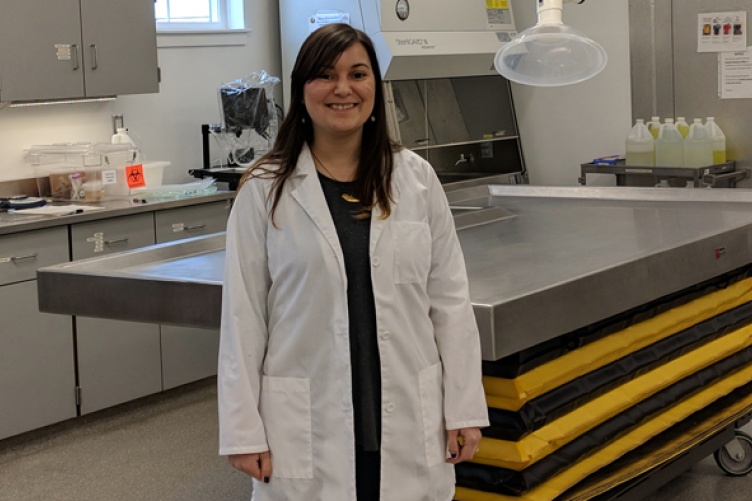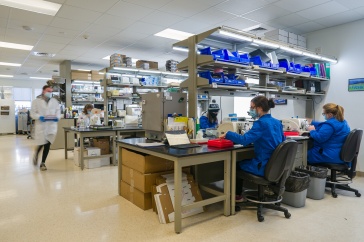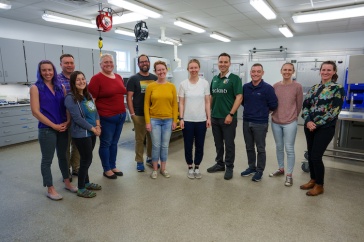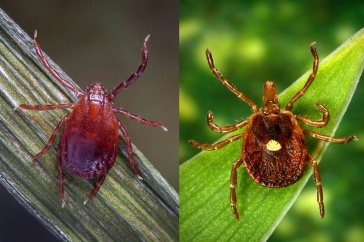
Jackie Marinoff’s dream of becoming a veterinarian has taken her far from the University of New Hampshire since she graduated in 2013 with her undergraduate degree in equine studies/pre-veterinary medicine. She has pursued her doctor of veterinary medicine at the University of Georgia and furthered her studies with externships in pathology at Colorado State, Michigan State, North Carolina State, Tufts, and Cornell.
However the UNH College of Life Sciences and Agriculture valedictorian recently returned to campus for an intense, three-week pathology externship at the New Hampshire Veterinary Diagnostic Lab (NHVDL), which is co-managed by the New Hampshire Department of Agriculture, Markets & Food and the New Hampshire Agricultural Experiment Station. Since 1970, the lab has provided accessible, timely and accurate diagnostic services for the New Hampshire Department of Agriculture, Markets, & Food, New Hampshire Department of Health and Human Services, New Hampshire Fish and Game Department, state and local law enforcement agencies, veterinarians, farmers, state, regional, and federal agencies, and individuals. The diagnostic lab also contributes to the education of students seeking training in the biomedical sciences.
“I chose to come to the NHVDL because I wanted to experience the day-to-day operations of a state diagnostic lab, and where better to do that than in my home state? I did a number of anatomic pathology externships at other schools in preparation for residency applications, but they were all academic institutions. I wanted to see what a career would be like in a more strictly diagnostic setting without a residency program,” said Marinoff, who will graduate from Georgia this spring.
 During her externship, she worked closely with the three boarded pathologists on staff, primarily reading biopsies and cytologies, performing necropsies, and practicing writing diagnostic reports. She received training from NHVDL senior veterinary pathologist Dr. Inga Sidor in fish pathology, which is a specialized area within the field of pathology. She also worked with NHVDL senior veterinary pathologist Dr. David Needle on a new wildlife pathology project.
During her externship, she worked closely with the three boarded pathologists on staff, primarily reading biopsies and cytologies, performing necropsies, and practicing writing diagnostic reports. She received training from NHVDL senior veterinary pathologist Dr. Inga Sidor in fish pathology, which is a specialized area within the field of pathology. She also worked with NHVDL senior veterinary pathologist Dr. David Needle on a new wildlife pathology project.
“I'm practicing skills that are directly applicable to my future as a veterinary pathologist, because the basis of this job is being able to formulate a diagnosis based on your observation ability, knowledge base, and critical thinking ability. The more cases that I see and work through, the better I get at recognizing changes grossly and microscopically while also expanding my knowledge of diseases and pathogenesis,” she said.
Following graduation from Georgia, Marinoff will begin a three-year pathology residency at Cornell. She saw her NHVDL externship as an opportunity to gain expertise with necropsy and histopathology. In addition, she plans to return home to New Hampshire following her Cornell residency. Her externship experience has allowed her to make connections with the pathologists and potential future colleagues. Ultimately, Marinoff plans a career as a veterinary anatomic pathologist in a diagnostic setting. “Anatomic pathology combines all the facets of veterinary medicine that I find the most compelling in one field, so that is the direction I chose to take my career,” she said.
Marinoff transferred from Keene to UNH in her sophomore year as soon as she realized she wanted to go to veterinary medical school. “UNH is the perfect place to do your pre-vet studies. What really drew me to UNH was the huge animal science program, with opportunities like CREAM (Cooperative Real Education in Agricultural Management) and the equine classes for hands-on exposure to large animals that can be hard to come by at other institutions. UNH also has the NHVDL right on campus, with opportunities for student employment that can give you a fairly unique experience to make your vet school application stand out, as well as faculty veterinarians who serve as both teachers and advisors,” she said.
Marinoff said she felt extremely well-prepared for her veterinary studies at Georgia. Not only was she able to complete the pre-requisite courses for her vet school applications, the hands-on experience with the horses was invaluable. Many of her equine-specific classes with a strong focus on medicine served as an excellent foundation for her vet school classes. Even her time spent riding on the UNH’s Intercollegiate Horse Show Association team, working at the UNH horse trials, and learning basics like tack and how to longe have proved to be important in helping her communicate with clients in a large animal hospital.
“Overall, I had an easy transition to vet school, and I attribute a large part of that to the great pre-vet work I was able to do with the equine studies program,” she said.
This material is based upon work supported by the NH Agricultural Experiment Station, through joint funding of the National Institute of Food and Agriculture, U.S. Department of Agriculture, and the state of New Hampshire.
Founded in 1887, the NH Agricultural Experiment Station at the UNH College of Life Sciences and Agriculture is UNH’s original research center and an elemental component of New Hampshire's land-grant university heritage and mission. We steward federal and state funding, including support from the USDA National Institute of Food and Agriculture, to provide unbiased and objective research concerning diverse aspects of sustainable agriculture and foods, aquaculture, forest management, and related wildlife, natural resources and rural community topics. We maintain the Woodman and Kingman agronomy and horticultural research farms, the Macfarlane Research Greenhouses, the Fairchild Dairy Teaching and Research Center, and the Organic Dairy Research Farm. Additional properties also provide forage, forests and woodlands in direct support to research, teaching, and outreach.
-
Written By:
Lori Wright, '06G | NH Agricultural Experiment Station | lori.wright@unh.edu | 16038621452



















































